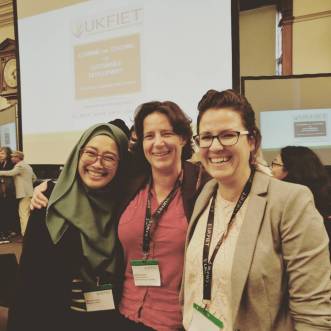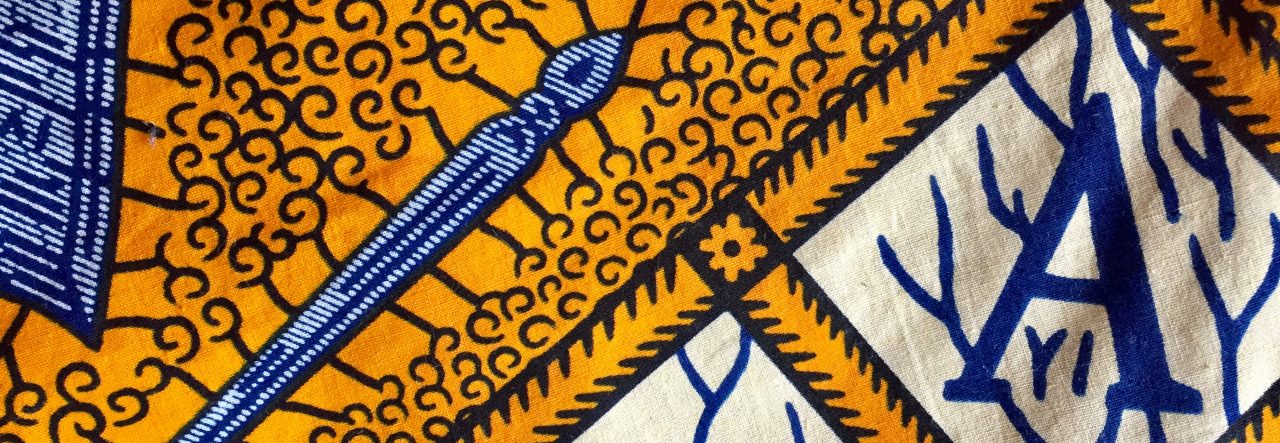In the past month, CIRE members have been active at conferences around the UK. This post is the first in a series that details recent conference presentations and publications.
Learning and Teaching for Sustainable Development
CIRE at the UKFIET International Conference on Education and Development, University of Oxford, 5-7 September
by Angeline M. Barrett, CIRE Director
CIRE was well-represented at the 11th UKFIET Conference on Education and Development, on the theme Learning and Teaching for Sustainable Development. In total four staff and three students presented papers in sub-themes on Pedagogies for Sustainable Development, Enabling Teachers and Rethinking Curriculum, reflecting new and longstanding streams of research within CIRE.
Pedagogies for peace and sustainable development goes bananas

Julia Paulson and Angeline Barrett joined with James Lawrie of the Save the Children, to convene the subtheme on Pedagogies for Sustainable Development. Julia herself presented with Lizzi Milligan, University of Bath, on a review of history textbook analysis in post-conflict settings. The review found that very little research had gone beyond content analysis to ask questions about how textbooks were commissioned, produced and used in classrooms. Angeline’s paper co-presented with Prof. Kalafunja Osaki, St. Augustine’s University of Tanzania, however, did address the authorship and design of bilingual science textbooks created by teacher educators and curriculum developers in Tanzania. The presentation questioned whether targeting formal scientific language in just one language was sufficient to address sustainable development within multilingual societies. Kalafunja’s examples of the knowledge of 15 species of banana, preserved within his mother-tongue memorably illustrated the argument. David Bainton, a CIRE Research Fellow, presented his own reflections on the Language Supportive Teaching and Textbooks in Tanzania project, applying an epistemological justice framing to evaluate its bilingual pedagogies.
Enabling teachers: Continuous Professional Development, voice and wellbeing
Faizulizami Osmin and Leanne Cameron presented on very different forms of continuous professional development for teachers. Enabling Teachers subtheme. Faizulizami’s paper titled, Empowering Teachers through Self-Initiated Continuing Professional Development: A New Vision for Teacher Professional Development in Malaysia presented a critical analysis of the formulation and reception of a formal, centrally imposed policy on teachers. The analysis identified conflicts and tensions between how the policy was conceptualised by its authors as promoting autonomous responsibility for professional development; and how it was experienced, interpreted and implemented by practicing teachers as a top-down coercive initiative. This paper won a competitive grant from the British Association for International and Comparative Education (BAICE), which sponsored Faizulizami’s attendance at the conference. Leanne’s paper, Sustainable Continuous Professional Development? Considering models from East and Central African Teacher Associations, problematised the apparent autonomous professionalism associated with teacher associates. Drawing on data on Language Teacher Associations it highlighted the support and influence of external international sponsors, in particular US Department of State and British Council. The paper highlighted the different organisation of associations and their potential to foster sustained continuous professional development initiated by members, who are practicing teachers.

Faizulizami, Angeline and Leanne at UKFIET
In the same theme, Tigist Grieve, a postdoctoral fellow, presented Teachers’ Voice: Essentials for Pursuit of Sustainable Development in Teaching and Learning in rural Ethiopia. Her findings from ethnographic research in Ethiopia highlighted the professional and wellbeing concerns of teachers posted to rural schools. Drawing on her ongoing ESRC-GCRF research, Tigist stressed the materiality of voice, and argued, given the emphasis on inclusivity and learning in which teachers are imagined as ‘transformative agents’, their voice, agency and wellbeing must be part of the scholarly debate and key consideration for policy makers.

Tigist’s presentation
Rethinking the curriculum at Higher Education
Amy Walsh, a Masters student, presented on a Bristol Student Union sustainability project, Get Green, in her paper Learn Act Engage Create: A four-step approach to engage higher education students in sustainability. The project aimed to challenge staff’s and students’ attitudes to sustainability through a holistic approach to teaching and learning, which spanned the formal, informal and sublimal curriculum. It aimed to involve students engaging with ESD through the formal curriculum and then extending this to social action outside of their course. Her quick fire paper was presented in the subtheme Beyond Literacy and Numeracy: Rethinking the Curriculum.
New BAICE President: Michael Crossley
Also at the Conference, Prof. Michael Crossley was announced as the next BAICE President. For more on this see the School of Education news story. We look forward to hearing Michael’s Presidential Address at next year’s BAICE Conference, in York.
Publications related to this blog
Barrett, A. M. (2017): Making secondary education relevant for all: reflections on science education in an expanding sub-sector, Compare: A Journal of Comparative and International Education, DOI: 10.1080/03057925.2017.1343127
Barrett, A.M. & Bainton, D. (2016) (2016) Re-interpreting relevant learning: an evaluative framework for secondary education in a global language, Comparative Education, 52:3, 392-407, DOI: 10.1080/03050068.2016.1185271
Paulson, J. (2017). From truth to textbook: the Peruvian Truth and Reconciliation Commission, educational resources and the challenges of teaching about recent conflict. In M. J. Bellino, & J. H. Williams (Eds.), (Re)constructing memory: education, identity, and conflict. (pp. 291-311). Rotterdam: Sense Publishers.
Paulson, J. (2015). ‘Whether and how?’ History education about recent and ongoing conflict: A review of research. Journal on Education in Emergencies, 1(1), 7-37.
